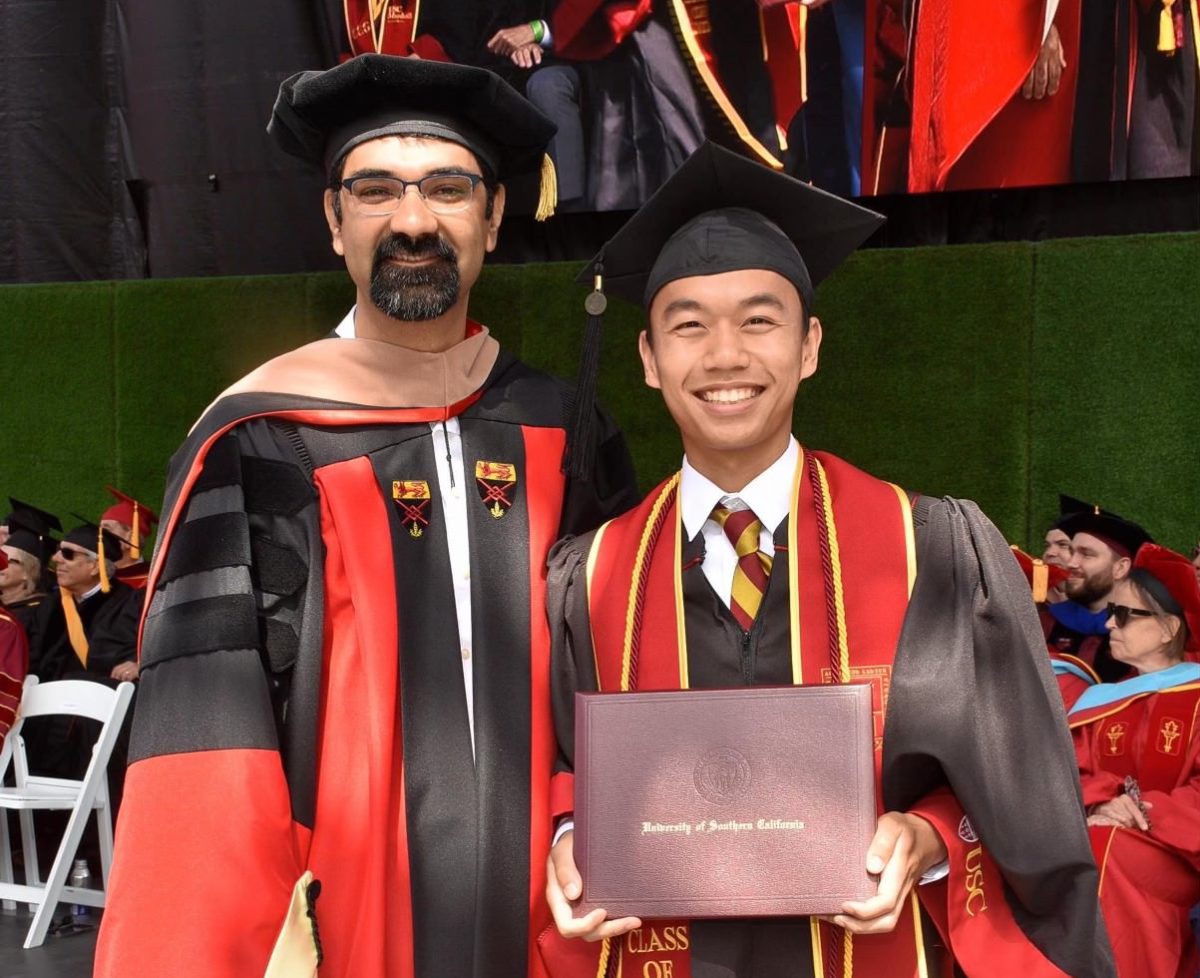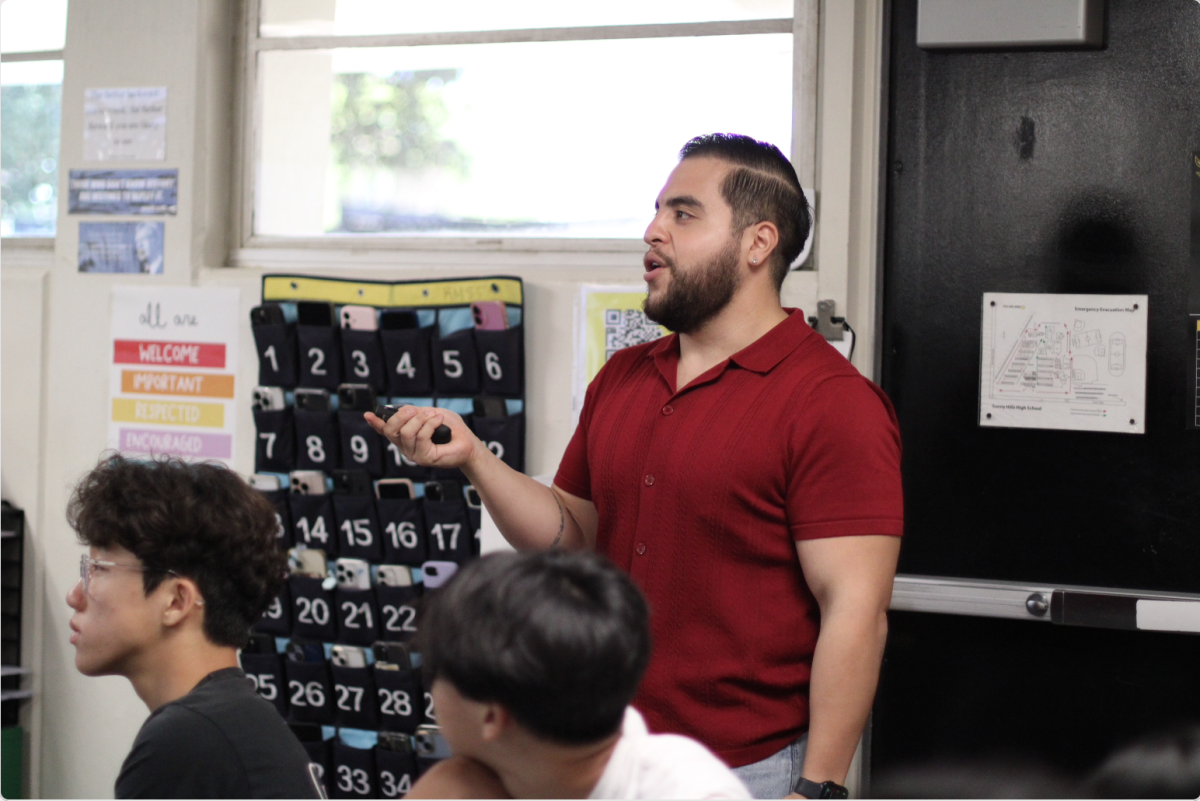The Accolade continues with its feature that focuses on those who have graduated from Sunny Hills and how they are contributing to their community and beyond. In this second segment, copy editor Soojin Cho connects with two Class of 2021 grads and how they were able to obtain their college degrees in three instead of the traditional four years.
Andrew Ngo was among the 18 Sunny Hills valedictorians from the Class of 2021.
From the 10 college acceptance offers Ngo had received, he said he narrowed them down to two: the University of California [UC], Berkeley – a public school – and USC – a private one.
Although the latter had offered $18,000 worth of scholarships and financial aid to help offset the Los Angeles-based university’s more than $30,000 tuition, the then-senior said UC Berkeley didn’t offer him any financial aid. Nevertheless, what caused Ngo to be torn in coming down to a final decision was that it would still cost more to attend USC than UC Berkeley.
As a former Accolade co-sports editor and online editor-in-chief, the SH alum said he ended up taking the financial hit and choosing to join the Trojan Family, known for its spirited support of its athletic programs that have won national championship titles in football (11 times), tennis (28 times), beach volleyball (seven times) and water polo (17 times).
The former Lancer tennis athlete then enrolled as a business administration major in the university’s Marshall School of Business with his parents taking out loans to help him pay for the cost of tuition, which averaged $35,000 per year, he said. He and his family had to also come up with the funds to pay for his campus housing.
It didn’t take him too long to then get embedded into campus life as he ended up spending most of his time volunteering for the Trojan Knights, a 100-year-old student-run program that keeps university traditions alive.
“I was very involved,” Ngo said. “Through the organization, I gave students campus tours and also awarded the winner of the annual USC football game [against crosstown rival UCLA] the victory bell, which has been going back and forth between UCLA and USC for years.”
A meeting with his college counselor during his second semester was what motivated him to end his college experiences a year early, said Ngo, who did not get paid for giving campus tours.
“We were just looking at my schedule, and she mentioned [I could] graduate in three years; I wasn’t aware because no one had told me that,” he said.
At first, Ngo said he was reluctant to leave behind what would have been his senior year on campus this school year because he had other goals in mind.
“I wanted to make sure that career-wise things worked out with the timing of summer internships and the return offers, so I kind of kept it in the back of my mind,” he said.
It was his acceptance to a summer 2023 internship at Wells Fargo, a financial services company in Los Angeles, that changed his college trajectory forever.
After his internship ended in mid-August, he said he received a return to work offer from the managing director, Scott Horpom, for post-graduation, leading to his decision to leave college after three years despite his love for USC. Graduating from campus early and accepting this job offer would give him a year’s worth of extra earnings since this position would give him a six-digit annual salary.
“I was happy and satisfied with [my decision],” the USC alumnus said. “If I wasn’t able to secure a full-time job that I liked for this summer of 2024, then I would have stayed that extra semester, but I didn’t need to, and things worked out.”
According to a 2020 National Student Clearinghouse report, 12% of students attending four-year private colleges did the same in the 2015-2016 school year, the most recent statistics available. That’s 2% higher than those who graduate in three years from public institutions.
Although Ngo avoided his fourth year of college, he said he still experienced an early dose of senioritis, which meant a decreased motivation toward completing assignments.
“Because I received the return offer, I put less effort into my classes,” the USC graduate said. “I think it’s because I wanted to do all the things that I wouldn’t be able to do [while on campus] after I graduated.”
NGO IS NOT ALONE
The commercial real estate analyst is not alone in experiencing college life for three years only. Ngo said he knows of around five SH friends who did the same thing this past school year, their reasons for doing so ranging from getting accepted into law school early and finding a job elsewhere.
One of those peers is Charis Lee, also a 2021 SH grad whom Ngo has known since his freshman year. When she accepted an admissions offer from UC Berkeley to major in English, Lee said like Ngo, she never entertained the idea of graduating a year early.
During her time at the Northern California campus, she said she participated in extracurricular activities, one of them being part of the staff of To an Unknown God magazine.

“I miss the people there, the community, going through the production process and planning events,” said Lee, former Accolade Feature editor. “We also used to go on a free trip to Boston every year, so that was something I was sad about.”
Unlike Ngo’s situation, the Berkeley alumna said she did not have an immediate full-time job offer to accept upon leaving college a year earlier than her peers who started there with her as freshmen.
However, after finding out about her graduation status through CalCentral — a website UC Berkeley students use to check their grades and status — she said she wanted to take the chance to save herself from further financial burdens, like her loans that she had worked part time to pay off.
After consulting with her parents, Lee said she made the final decision in December 2023, choosing financial savings of $30,000 over a final year of college life.
“I won’t be able to graduate with my class, and maybe some friends that I made along the way were in the same grade as me [whom I’ll no longer see],” she said. “But, I saved a big chunk of money in terms of not paying another year of tuition.”
And so on Thursday, May 16, 2024, the Berkeley grad said she invited her parents to come see her commencement ceremony.
“I was happy [to graduate]; since I made a lot of friends that are a couple of years older than me, I was glad we could graduate together,” said Lee, who moved back into her parents’ Fullerton home last summer after graduation and started working part time as an English tutor.
HOW TO GRADUATE FROM COLLEGE IN THREE YEARS
Despite more than a dozen secondary institutions joining a new movement known as College-in-3, in which the total number of units required to graduate is slashed for certain majors with fewer electives required like social sciences and business, Ngo and Lee used a different method for their ticket out of college.
For students to obtain college credits even before stepping foot on campus on the first day of their freshman year, they must receive a score of 4 or higher on International Baccalaureate exams and a score of 3 or higher on Advanced Placement ones.
Ngo said his passing scores led to 32 credits fulfilled, the maximum amount accepted at USC, adding that he had taken six IB classes and six AP courses at Sunny Hills. USC also allowed another 32 credits to transfer from five Fullerton College courses he had taken while in high school.
For Lee, she said Berkeley allowed her to add 20 units – a semester’s worth of five classes – into her transcripts from the seven IB exams she passed.
“I realized when I was a sophomore that if I just take a couple more classes [than usual], I can actually graduate early,” she said.
To complete the remaining eight of the 120 required college credits to graduate, Lee said she took an environmental and Scandinavian literature course in the summer of 2023.
Although she did not apply for a job like Ngo, Lee said she will use the time off to study for her Law School Admission Test [LSAT].
“I definitely prefer that I graduated early to study for this exam because it’s definitely difficult to juggle both school and the LSAT studying,” the aspiring lawyer said.
SHOULD OTHER STUDENTS AIM TO GRADUATE IN THREE YEARS?
SH college counselor Genesis Perez said the opportunity to graduate a year early could benefit those on a case-by-case basis.
“I don’t think it’s either a good or bad idea — it just depends on the student’s situation,” Perez said. “But, I would definitely say depending on the major they’re looking into, some of the majors are longer than three years for sure.”
According to an Accolade online poll asking, “Would you participate in the 3-year-degree programs and potentially graduate college in less than three years with AP/IB credits?” of the 127 responses as of Sunday, Dec. 1, 43 voted, “Yes, I would want to save a lot of money by not paying tuition.”
At the same time, the same number voted, “Maybe, I’m not too sure and will decide once I am in college.”
Sophomore Nathaniel Mitri falls in with the former group, adding that he was already aware of the opportunity to graduate earlier from his two older brothers who got their degrees from Cal Poly Pomona in three years or less (his eldest brother took two and a half years to graduate in 2021 and the second oldest took two years in 2024).
Mitri said he plans to follow his brothers’ paths by taking AP and dual enrollment classes, courses taken in community colleges that offer college credits like Ngo did.
“I’m doing it both to save money since classes taken in high school are free and because spending less time in college means I can spend more time in the workforce getting experience,” said the sophomore, who plans to major in computer science and apply for admission to either the University of California, Irvine, or California State Polytechnic University, Pomona.
Lee also encourages students to take the opportunity to graduate early if they feel it benefits them.
“I would recommend that they do what makes them happy and that if they have other plans, or if they feel afraid to maybe leave, then that’s all right, too,” she said.














